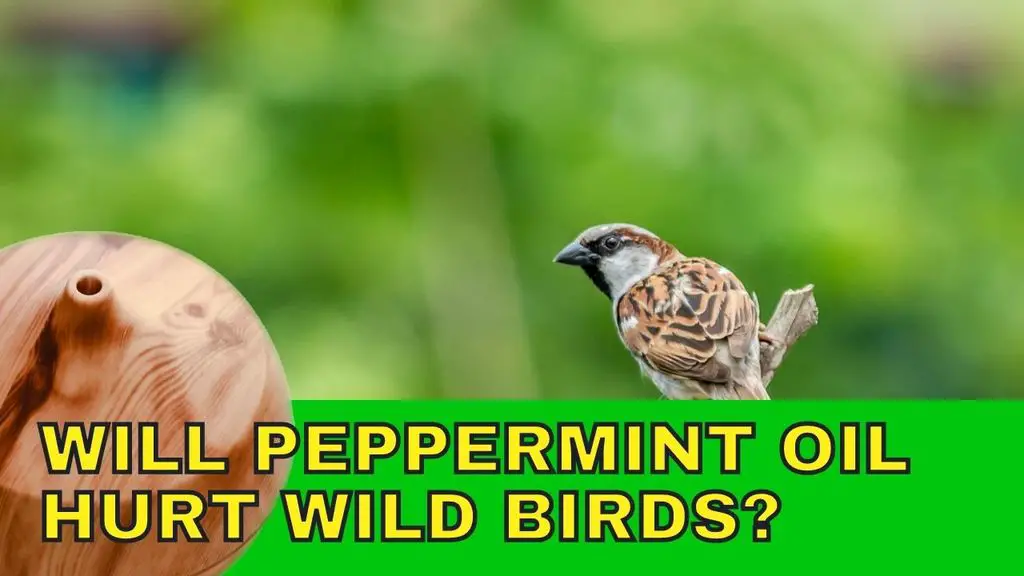Peppermint oil has a number of uses for health and wellbeing. Like many essential oils, it can also be used as a natural pest repellent, as it contains scents that pests don't like, or blocks the receptors that insects use to seek out food sources. But will peppermint oil hurt wild birds if you leave it out in your garden?
The answer is no - not unless a bird consumes the oil, which is highly unlikely, as most birds don't like the scent. If anything, you'll just end up repelling birds from your garden with the use of peppermint oil, not hurting them.
If your goal is to deter birds without affecting your local wildlife, diffusing peppermint oil in your garden, or spraying the oil on popular bird perches, should do the trick.
Does the Smell of Peppermint Bother Birds?
Most humans love the smell of peppermint oil, but birds, with their weaker lungs, find the scent overpowering. This makes peppermint oil a good option for repelling anything with wings from your garden.
There are several options to consider when it comes to repelling birds or other pests with peppermint oil:
Peppermint Oil Spray
To make peppermint oil spray, add water to a small spray bottle and add a couple of drops of peppermint oil. Shake well, and shake before every application, as the oil will separate from the water. Spray the mixture in areas that pests frequent.
Peppermint Oil Cotton Balls
For a more concentrated application, you can saturate a cotton ball in peppermint oil, then leave the ball in a spot where pests commonly enter your home. The strong scent from the cotton ball should deter pests from taking their usual route.
Peppermint cotton balls can also mask the pheromone trail left by rodents, which other rodents may follow to get into your home.
Concentrated Peppermint Oil
If woodpeckers are causing a problem in your home, you can try dabbing peppermint oil onto the spots where they're pecking. Again, the smell of the oil should prevent the birds from approaching the area.
Of course, if you don't actually want to repel birds with peppermint oil, just don't use it outside of your home. The smell won't be strong enough to repel birds if you're using the oil inside.
Can Essential Oils Kill Birds?
There's mixed information online about whether essential oils can kill birds. Some online sources say that certain oils, including pine, cedarwood, melaleuca and citronella, are toxic to birds, but there's very little evidence to suggest this.
Either way, birds are generally smart, and won't drink from essential oils or bathe in these oils. If you're just trying to deter birds with essential oils, but you don't want to harm them, you shouldn't worry too much. Birds will stay away from the oils because of their strong scent, so they won't get close enough to be harmed.
Diffusing essential oils may also kill birds, or at the very least cause respiratory problems, according to some online sources. If you have pet birds inside your home, make sure to diffuse essential oils in a separate, well-ventilated room, or avoid diffusing oils completely.
Are Birds Allergic to Peppermint Oil?
Again, there's conflicting information about whether peppermint oil can cause an allergic reaction in birds.
It's more likely that essential oils are toxic to birds, rather than being allergens. This is because many essential oils contain volatile organic compounds, and are very potent. While these oils don't affect humans when diluted as recommended, they can have stronger reactions in small animals, like birds.
Birds are particularly sensitive animals, which is why they're likely to suffer a reaction, although not allergic, if they ingest peppermint oil or get it on their feathers.
In Summary
In short, peppermint oil is safe to use in your garden if repelling birds and other pests is your goal. However, it isn't guaranteed to work.
If natural remedies like pesticides don't do the trick, and you're dealing with a particular bothersome bird issue, you may need to call pest control. But keep in mind that most cases aren't serious enough to be dealt with by a professional (unless, for instance, you have birds nesting in your building).
You may simply need to learn to live with the birds around your home, no matter how noisy or destructive they are!
